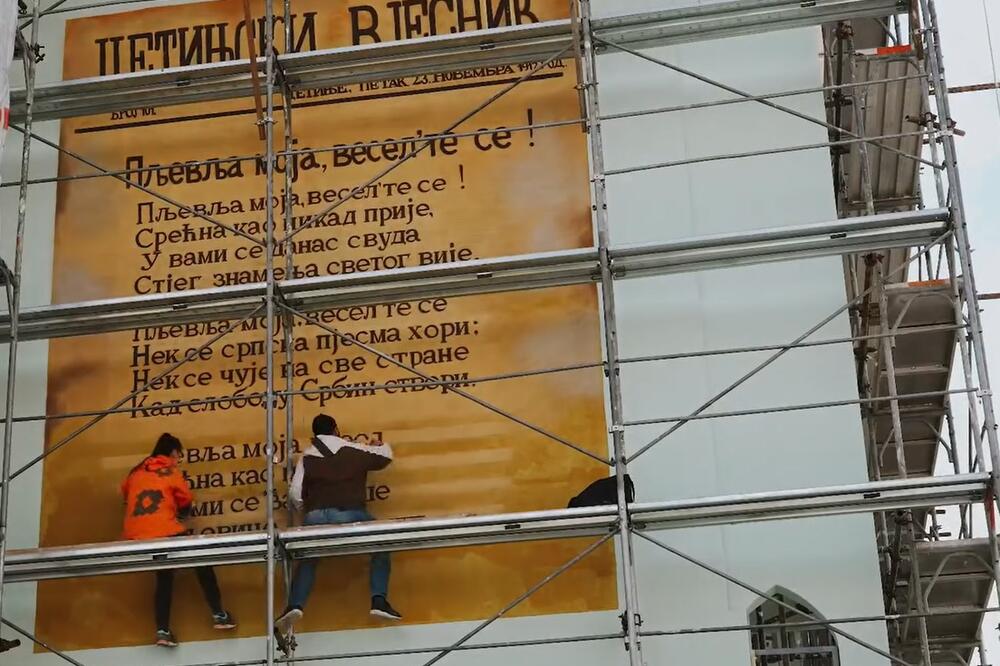A mural with the lyrics of the song "Pljevlja moja, vesel' te se" by Dimitrije Jevtović Polimac was painted on the facade, as the people of Pljevlja popularly call the Borova building, in the strict center of the city.
The lyrics of the song read: "My Pljevlja, rejoice! Happy as never before, the sign of the holy is everywhere in you today. My Pljevlja, rejoice, let the Serbian song sing, let it be heard on all sides when freedom Serbian creation. Rejoice, my city of Pljevlja, happy as never before, two Serbian kingdoms embrace each other in you."
The mural was drawn by academic artists Tamara Osmajlić and Stefan Stojanović from Vranje.
Jevtović wrote this poem in 1912 after the liberation of Pljevlja from centuries of Turkish slavery.
The poem was published in the Cetinje Vjesnik on November 23, 1912, which is also highlighted on the mural.
"Through the verses, Jevtović depicted the armies of Kravljevina Serbia and the Kingdom of Montenegro in Pljevlje, that is, as the poet says, two Serbian kingdoms." Polimac was a painter and sculptor and a long-time national and educational worker, a reserve officer of the Serbian Army, a participant in the First Balkan and European War, a Thessaloniki fighter and a war correspondent of the Third Serbian Army. He was first appointed in education in 1909 as a singing drawing teacher at the Grammar School and Girls' School in Pljevlja", it was announced on the Facebook page of the Municipality of Pljevlja.
For the president of the Non-Governmental Organization "Husein Pasha", Denijal Geljić, "the administration of the Municipality of Pljevlja continues to create an apparent image of a single-ethnic Serbian city".
"We are not disappointed because we have never been charmed by people like the current leadership of our municipality. We know that we cannot teach them behavior or culture, because whatever we say to them is like pouring water into a hollow water bottle. When the bottle is hollow, it should be replaced. However, we are advertising for one single reason: to make it known that we do not agree to satirize the fact that this city is multi-ethnic and that only what belongs to everyone is welcome in it. A poem as a poem would not bother us in any collection of poems or magazine, because it is a reflection of the art and culture of one poet from one nation. However, we are very concerned about the moment when the very song that encourages the creation of Greater Serbia is depicted as a mural. Not at all naive, we are aware that this is just one in a series of satisfactions for raising the awareness of some ideologies that do not have a very original history. As an organization, it is our task to affirm the cultural heritage of Bosniaks in this city, but in order to achieve this basic goal, this city must also be presented as it is: a city where a good percentage of Bosniaks live," stated Geljić in his response.
He hopes that the mural will be recognized as the evil intention of some evil people who have fallen on some bad times.
"And that the evil will pass quickly, so let's all return to our beautiful culture, Serbs to Serbian, Bosniaks to Bosniak, and to enjoy the colorfulness of our city, which is more beautiful than any mural," pointed out Geljić.
The former imam of Hussein Pasha's mosque in Pljevlja, Samir Kadribašić, wrote on his Facebook page that Pljevlja is neither a Serb nor a Bosniak city.
"You can draw as much nonsense as you want and freak out as long as you want, Pljevlja is at least a Serbian city. "Pljevlja is the city of Pljevljaks, honest people and hosts," wrote Kadribašić.
Bonus video:




